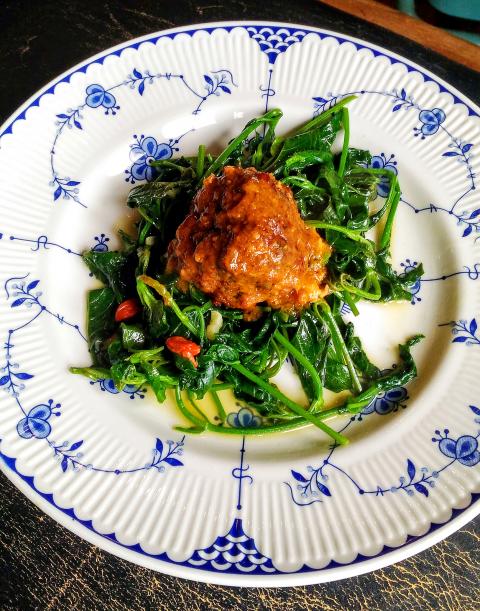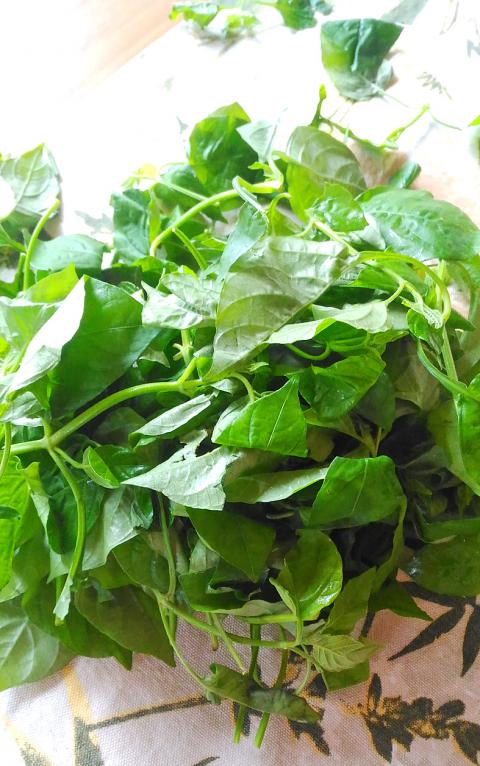Goji berries have had their time in the limelight, featuring as a superfood on recent Western menus, though they have long been an integral part of Chinese medicinal lore and are often used in “tonic” dishes, particularly soups. Often ignored are the leaves of this plant, which are remarkably nondescript in appearance but which many culinary and pharmacological commentators regard as nearly as good as the berry in terms of the benefits they bestow.
I first came across goji leaves by accident, mistaking them for sweet potato leaves not so much due to their appearance, but simply due to the casual way they were presented in the market stall, strewn across a tarpaulin to be easily scooped up an armfuls. Because of their incredible cheapness, goji leaves are not accorded much ceremony.
This is the sort of vegetable I warm to ideologically, but often these so called “wild greens” don’t taste so great on the dinner plate. I have tried quite a range of such greens and written about a couple, and while they definitely afford a source of nutrition and often considerable health benefits, their uses are often limited to one or two specialty dishes that are notable more for cultural interest than gastronomic excitation.

Photo: Ian Bartholomew
Goji is also called Chinese wolfberry, and is part of the nightshade family that includes culinary heroes such as potatoes and tomatoes, but also poisonous plants such as belladonna. A few years ago, goji shot from obscurity in the Western world to something that everyone was talking about for its amazing health-giving properties. This celebrity status has started to wane, along with the buzz around superfoods generally, as science continues to show that no amount of superfood will make up for a balanced diet of regular, non-super food that is conscientiously cultivated. It should also be said at the onset that there is little scientific support for many of the claims made for goji berries. That said, while the belief that they are able to induce perpetual youth and stop cancer in its tracks may be overblown, there is little doubt that they are a healthy part of anyone’s diet.
The leaves of this perennial have been all but forgotten, but in the hot summer days when locally grown greens are hard to come by, goji leaves prove to be surprisingly versatile. Tossing a bunch in the pan with a few lightly beaten eggs produces a very flavorful omelet that is delicious with just a little soy served over white rice. They can also be cooked until soft, and in Taiwanese cuisine they are probably most often seen in soups where their bitterness is mitigated by the liquid. It is often part of pig’s liver soup, the ultimate Chinese tonic soup prescribed by grandmothers for every ailment known to mankind.
Don’t be put off by the rather pedestrian appearance of goji leaves and work past the initial flavor of bitterness in the raw leaves, as goji leaves are one of those “wild greens” whose taste is relatively accessible, particularly if care is taken to pair it with other complementary flavors. In fact, the leaves and the berries make an excellent pairing, as the berries have a unique sweetness that mixes well with the complex flavor of the leaves. While the leaves are most often found in the budget section of a traditional market (I can get enough for two family meals for under NT$20), and the berries are mostly found in more upscale groceries or Chinese medicine stores, when fruit and leaf are brought back together in the kitchen, it is definitely a tasty reunion.

Photo: Ian Bartholomew
Lamb meatballs with tomato sauce and goji leaves
(Serves 2)
Goji leaves can be eaten simply fried with a bit of garlic and stock, but they do have a slightly bitter taste that can be off-putting for some. This bitterness works to its advantage when paired with rich meat such as lamb, helping to cut through the oil and balance the flavor. This fusion of Middle Eastern style lamb with Far Eastern vegetables might be pushing fusion into confusion, but the mix has proved successful in our family. Since both the meatballs and sauce can be frozen, you can bring this dish from the freezer onto the table within an hour with very little active preparation required. Adding the goji berries to the leaves provides additional color and a hint of sweetness that is quite appealing.
Ingredients
For the meatballs:
500g minced lamb
2 tsp cumin seeds
2 tbsp coriander seed
1 big pinch of salt
1 tsp black pepper
1 chili, seeds and ribs removed, minced
50g fine breadcrumbs
4 garlic cloves, crushed
juice of one lemon
1 egg
bunch of mint leaves, roughly chopped
For the tomato sauce:
(this makes plenty of sauce, ideal for freezing and topping on anything from pasta or thickening soup)
1kg tomatoes
1 tsp each of salt, black pepper and sugar
1 brown onion
1 carrot
1 clove garlic
olive oil
600ml vegetable stock
For the goji leaves:
1 bunch goji leaves
1 tbsp of dried goji berries (optional)
2 cloves garlic
salt and white pepper to season
1/4 cup vegetable stock
Directions:
1. Mix all the ingredients for the meatballs together, preferably using your hands, digging into the mixture and churning it so that all the ingredients mix together thoroughly. You can feel that the mixture is right when the meat has a smooth consistency to it, making the hands much superior to spoons or spatulas.
2. Shape into golf ball sized meatballs. These can be frozen and keep well in the freezer for up to a month.
3. Cut the tomatoes in half and place in a baking tray. Sprinkle with salt, pepper and sugar then drizzle generously with olive oil. Place in an oven pre-heated to 200c and roast for 1 hour.
4. Roughly chop the onion, carrot and garlic and cook over low heat in a large pot until soft. Add the roasted tomatoes and stock to the pot then bring to a boil. Turn down heat to low, cover pot and cook for 25 minutes.
5. Allow to cool. Once cool enough to handle safely, blitz the mixture into a thick puree in a blender. This mixture can be frozen for up to two weeks.
6. Put the meatballs in an oven-proof sautee pan with some oil and brown over as much of the surface as possible, about 15 minutes over medium heat. Remove meatballs and pour off excess oil.
7. Add the tomato sauce to the saute pan and bring to a simmer, stirring vigorously with a wooden spoon to loosen any of the tasty bits that stick to the base of the pan during the browning process.
8. Add the meatballs to the sauce, coating them lightly before putting them in a pre-heated oven at 180c for 40 minutes.
9. Just before the meatballs are done, heat some oil in a skillet. Throw in the garlic and fry until fragrant then add the goji leaves. Season with salt and white pepper, then add some stock and the dried goji berries
10. Stir over medium heat for another minute then remove from heat.
11. Place the goji leaves on a plate and scoop the meatballs and now thickened sauce over the top.
Ian Bartholomew runs Ian’s Table, a small guesthouse in Hualien. He has lived in Taiwan for many years writing about the food scene and has decided that until you look at farming, you know nothing about the food you eat. He can be contacted at Hualien202@gmail.com.

Taiwan has next to no political engagement in Myanmar, either with the ruling military junta nor the dozens of armed groups who’ve in the last five years taken over around two-thirds of the nation’s territory in a sprawling, patchwork civil war. But early last month, the leader of one relatively minor Burmese revolutionary faction, General Nerdah Bomya, who is also an alleged war criminal, made a low key visit to Taipei, where he met with a member of President William Lai’s (賴清德) staff, a retired Taiwanese military official and several academics. “I feel like Taiwan is a good example of

March 2 to March 8 Gunfire rang out along the shore of the frontline island of Lieyu (烈嶼) on a foggy afternoon on March 7, 1987. By the time it was over, about 20 unarmed Vietnamese refugees — men, women, elderly and children — were dead. They were hastily buried, followed by decades of silence. Months later, opposition politicians and journalists tried to uncover what had happened, but conflicting accounts only deepened the confusion. One version suggested that government troops had mistakenly killed their own operatives attempting to return home from Vietnam. The military maintained that the

Before the last section of the round-the-island railway was electrified, one old blue train still chugged back and forth between Pingtung County’s Fangliao (枋寮) and Taitung (台東) stations once a day. It was so slow, was so hot (it had no air conditioning) and covered such a short distance, that the low fare still failed to attract many riders. This relic of the past was finally retired when the South Link Line was fully electrified on Dec. 23, 2020. A wave of nostalgia surrounded the termination of the Ordinary Train service, as these train carriages had been in use for decades

Lori Sepich smoked for years and sometimes skipped taking her blood pressure medicine. But she never thought she’d have a heart attack. The possibility “just wasn’t registering with me,” said the 64-year-old from Memphis, Tennessee, who suffered two of them 13 years apart. She’s far from alone. More than 60 million women in the US live with cardiovascular disease, which includes heart disease as well as stroke, heart failure and atrial fibrillation. And despite the myth that heart attacks mostly strike men, women are vulnerable too. Overall in the US, 1 in 5 women dies of cardiovascular disease each year, 37,000 of them